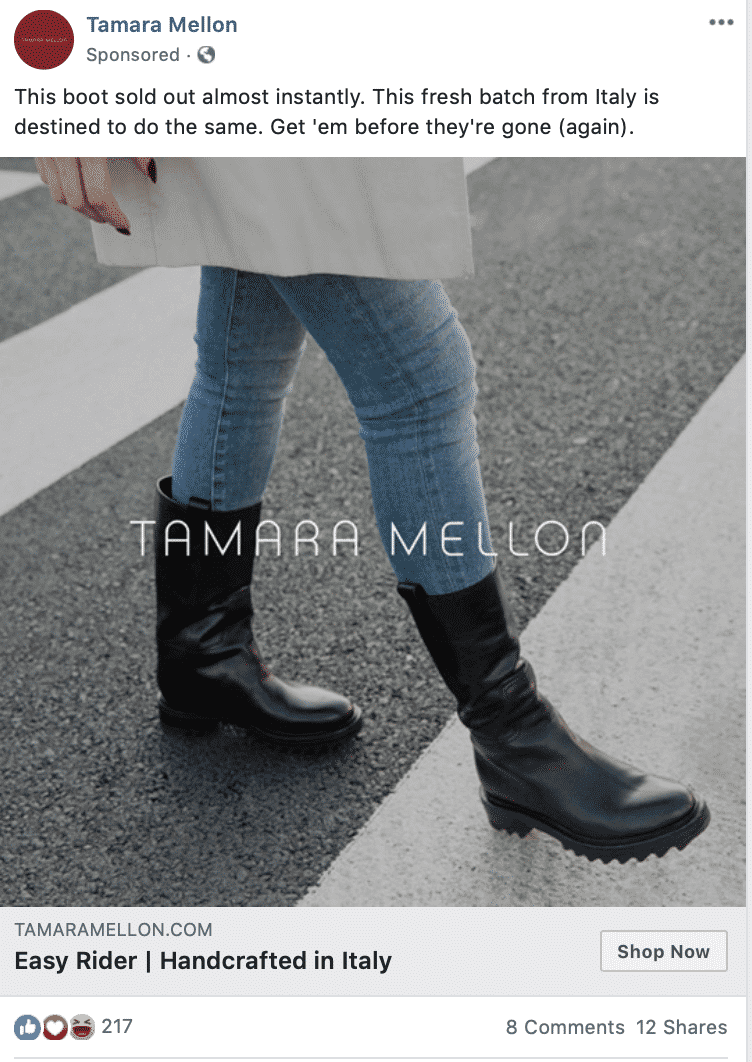Google Ads vs Facebook Ads: Which is Right For You?
by Ana Gotter • September 30, 2019
There are so many choices that marketers have to make before they even dive fully into strategy development and execution, and one of those choices is deciding what marketing mix they want to go with. This determines which platforms they’ll be using, and allows them to start breaking down their marketing budget into categories like email marketing, PPC campaigns, social media, SEO, and more.
But even once you do that, of course, you need to break it down further, which brings many marketers to one question: In the debate between Google Ads vs Facebook Ads, which is better?
This is a tricky question, because though Google Ads and Facebook Ads both fall under the pay-per-click advertising category, they work differently. The “right” choice for your business will likely be vastly different than it would be for a business that’s a different size, or one that’s in a different industry, or is newer vs more established. Factors like how the platforms work, the audiences they can help you reach, their cost, and important average KPIs all play a factor.
So which is better, and how do you decide between Google Ads vs Facebook Ads? There really isn’t a clear cut answer, but in this post, we’re going to dive in and give you the information you need to decide which platform (or platforms) you want to advertise on.
Before We Get Started…
As crazy as it may seem, we can mean a lot of different things when we say “Google Ads” and “Facebook Ads.” Google, for example, owns YouTube, and you can create YouTube Ads from the same dashboard. They also have both search ads and their display network ads. Similarly, Instagram Ads are grouped into Facebook (though in a much more significant and integrated way).
For this post, here’s what we mean:
- “Google Ads” will primarily be used to describe search ads, and we’ll note information about Google’s Display Ads separately. YouTube Ads will not be covered in this post due to some big differences.
- The term “Facebook Ads” will include all placements including Instagram Ads, unless otherwise specified. We’re going to look specifically at discovery ads right now, because while Facebook is testing search ads, this feature isn’t developed yet or available to the vast majority of advertisers, so we have no data to work with at this time.
Now that we’re all on the exact same page, let’s get started!
Google Ads vs Facebook Ads: The Breakdown
Google Ads and Facebook Ads have a lot of differences, with only a few things in common: they’re both effective, they both need testing, and they both use an auction-based system that allows you to bid for placements and specific actions.
There are many differences, of course, that start with how the two platforms work, so let’s take a look at each so you can best decide which you want to start with.
How They Work
Both platforms function completely differently at their core (discounting Google’s Display network, of course, which we’ll look at, t00).
Google’s primary form of campaigns is their search ads, which work by showing relevant ads that align with a user’s search queries. If they’re searching for “leather sofa,” for example, and you happen to sell leather sofas, you could bid to have your ad shown to these users.
The ads appear at the top of the search results and give you short headlines and two lines of ad text (minus extensions) to explain why users should click.

Search ads are particularly powerful because they allow you to reach people who are actively looking for content and/or products like yours. You can capture them when they’re in the crucial research stage of the buyer’s journey, hopefully getting them to purchase from you and likely snagging them from the grasp of your competitors. You’re using keywords as the main targeting option here.
Google Ads, therefore, is typically focused on lead generation and/or conversions.
Google’s Display Network, on the other hand, works a little differently and more like Facebook. Here, you can show an ad including an image or video on participating sites all over the internet, either through retargeting or by placing relevant content on relevant sites. This is focused more on creating demand, which we’ll talk about more with Facebook now.
Facebook Ads are all about creating demand. You use interest-based and demographic targeting along with retargeting options to have your ads appear in placements on and off-platform. You don’t have to wait for certain searches to be made and for clients to look for products like yours—you can show them an ad, introducing your product to them or reminding them that it’s there.

Facebook Ads often require multiple stages of the sales funnel to drive users all the way from brand awareness to conversion, but their retargeting makes this possible. There are also a number of different placements that allow you to do this in an omni-channel way, reaching them on Messenger, Instagram, and even on participating apps that have nothing to do with Facebook (think Google’s Display Ads).
Facebook has a number of different ad formats available, including video, carousel ads, Instant Experiences, Stories, and more, giving you a ton of creative flexibility.
Average Cost
Cost is a big factor when you’re considering how to divide up your ad spend and what types of campaigns will be most profitable, right? Unfortunately, there is no definitive answer to how much either Google Ads or Facebook Ads cost, and that’s because a number of factors will impact each. Still, we’ve got some general guidelines, so let’s take a look.
With Google’s search ads, you’re looking at costs that can vary to the extreme. A keyword like “dance shoes” might only cost $3 per click, but a keyword like “personal injury attorney” can cost you well over $100. This is all because advertisers can set their bids based on what they’re willing to spend, and some keywords are likelier to trigger high purchases orders than others.
Dance shoes, for example, may cost anywhere from $10 to $100, but a personal injury attorney may charge upwards of $150 an hour, so paying $100 to land that click and get the client is worth it.

That being said, you’re looking at an average of a $1-3 CPC on Google Ads for most keywords. It’s still a good idea to check Google’s Keyword Planner for an accurate forecast about the range of CPC costs you may expect to pay for the specific keywords that you’re interested in, and then judge whether or not it’s cost-efficient then.
Note that you can set maximum bids on Google Ads, which allows you to decide the max you’re willing to spend per click. You may limit placements or your ad rank for a lower bid, but it gives you more control.

Ads on the Display Network typically see much lower CPCs than search ads, often coming in at under $1 per click. That being said, remember that these ads aren’t capturing demand, so there may be less chance of a conversion.
Facebook’s costs, like Google, can vary, though not nearly as drastically. Factors that influence cost will include your relevance scores (with higher relevance scores lowering your CPC), competition in the marketplace (high competition drives costs up), the placements you’re bidding on, the actions you’re optimizing for, and the specific audience you’re targeting.
As a general rule of thumb, Facebook CPC costs $0.22 on average for clicks, with up to $1.21 costs for reach. It’s not uncommon to see cost per actions (CPAs) to go up close to $2, but that’s not quite as common as it used to be. A strong, relevant campaign with diverse placements can take advantage of lower CPCs than Google on average.
Average Click-Through Rate
The average click-through rate will tell you how often ads on each platform are getting clicked after being viewed. They can tell you how relevant your ad campaign is and how much interest it’s gauging. Click-through rates are important as they’re the first step to getting those conversions, and at the very least putting your brand into the consideration part of the process.
The average click-through rate for Google’s search ads is around 2%. Some industries—like the legal or advocacy industries—may have lower click-through averages, while others have much higher (including dating profiles, and finance and insurance). You can see the averages based on industry here.
Click-through rates on Display ads are much, much lower, hovering around 0.35%.
Click-through rates can vary, with certain placements like carousel ads increasing their potential. That being said, according to WordStream, the average CTR on Facebook is around .90%. This is less than half of Google’s CTR for search ads, but significantly more than the display ads’ metric.
Average Conversion Rate
When you’re considering “conversion rate,” the classic definition here is “sale.” When it comes to PPC, however, that’s not always the case.
Conversions can be the completion of any action that you’re optimizing for, including views of a landing page, lead generation forms being completed, videos being watched, events being registered for and more. The conversion rate is therefore how many people will purchase after clicking in this context.
Google’s average conversion rate hovers around 3.48% for search ads, and .72% on the display network. Display ads, therefore, are really best suited for strong, focused retargeting campaigns if you’re trying to make sales through them.
Our best data shows that Facebook’s average conversion rate is around 9.21%, which is surprisingly high overall considering the nature of the platform. Retargeting and tight ad campaigns can help boost the conversion rate, but conversions are most frequent earlier in the funnel when you’re asking users to sign up for a free webinar or download an ebook instead of making a substantial purchase.
Google Ads vs. Facebook Ads, Which is Best?
At the end of all of this, there’s no immediate answer as to which is better in the Google Ads vs. Facebook Ads debate. It all comes down to what will benefit your specific campaigns most.
Trying to target clients who need a neurosurgeon via Facebook and generic targeting, for example, will never be as effective as running a tight Google search ad campaign, but using Facebook to generate brand awareness for a new product is a great call.
Facebook’s lower costs and high conversion rates are definitely appealing, making it the first choice for many advertisers, but the ability to capture users actively looking for what you sell shouldn’t be overlooked, either.
In most cases, brands and organizations of all shapes and sizes will choose to at least test both platforms. You can use Facebook to generate brand awareness, for example. You can also Google search ads to capture people further in the buying cycle and hit them up again with retargeting campaigns through display ads and Facebook’s retargeting if they don’t convert upfront.
Consider your specific needs, your audience, and how you can best reach them. Look at the cost of keywords you’d want to target, and estimated costs and reach on each platform. This can help you make your decision.
Need some help getting your PPC campaigns in order? We can help with that. Learn more about what we can do for you here.
What do you think? Which works best for you—Google Ads vs Facebook Ads? Have you tested both? Share your thoughts and questions in the comments below!




